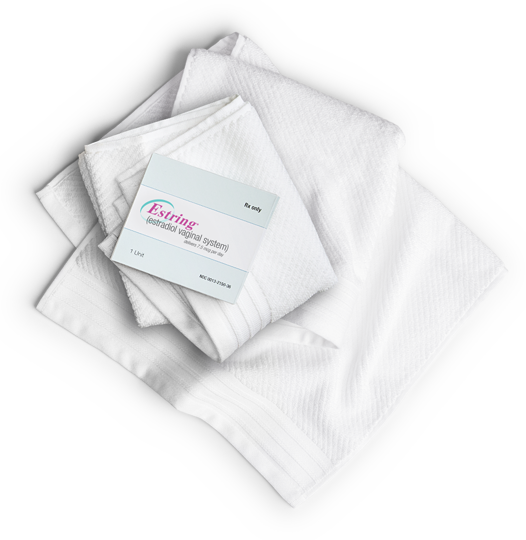



Keep in mind that estrogen therapies such as Estring should be used only as long as needed. You and your doctor should talk regularly about whether you still need treatment with Estring.
*Eligibility required. No Membership Fees. This is not health insurance. Available to commercially insured patients only. State and federal beneficiaries and cash-paying patients not eligible. Savings up to $360 per prescription fill. Maximum benefit per patient is $1,440 per calendar year. Terms and Conditions apply.
Using estrogen alone may increase your chance of getting cancer of the uterus (womb). Report any unusual vaginal bleeding right away while you are using Estring. Vaginal bleeding after menopause may be a warning sign of cancer of the uterus. Your healthcare provider should check any unusual vaginal bleeding to find out the cause.
Do not use estrogens with or without progestins to prevent heart disease, heart attacks, strokes, or dementia (decline in brain function).
Using estrogen alone may increase your chances of getting strokes or blood clots. Using estrogens with progestins may increase your chances of getting heart attacks, strokes, breast cancer, or blood clots.
Using estrogens, with or without progestins, may increase your chance of getting dementia, based on a study of women 65 years of age or older.
Estrogens should be used at the lowest dose possible, only for as long as needed. You and your healthcare provider should talk regularly about whether you still need treatment.
Estring should be removed after 90 days of continued use. If continuation of therapy is indicated, the flexible ring should be replaced. You and your healthcare provider should talk regularly about whether you still need treatment with Estring to control these problems.
Estring should not be used if you have unusual vaginal bleeding, have, or had cancer, had a stroke or heart attack, have or had blood clots or liver problems, have a bleeding disorder, are allergic to any of its ingredients, or think you may be pregnant. In general, the addition of a progestin is recommended for women with a uterus to reduce the chance of getting cancer of the uterus.
If you take thyroid medication, consult your healthcare provider, as use of estrogens may change the amount needed.
Serious, but less common side effects include heart attack, stroke, blood clots, dementia, breast cancer, cancer of the lining of the uterus, cancer of the ovary, high blood pressure, high blood sugar, gallbladder disease, liver problems, changes in your thyroid hormone levels, and enlargement of benign tumors of the uterus (fibroids).
Call your healthcare provider right away if you get any of the following warning signs or any other unusual symptoms that concern you: new breast lumps; unusual vaginal bleeding; changes in vision or speech; sudden new severe headaches; severe pains in your chest or legs with or without shortness of breath, weakness and fatigue; memory loss or confusion.
Less serious, but common side effects include, headache, breast pain, irregular vaginal bleeding or spotting, stomach or abdominal cramps, bloating, nausea and vomiting, fluid retention, and vaginal yeast infection.
Carefully follow instructions for use. If you have difficulty removing Estring, contact your healthcare provider right away.
Estring is a local estrogen therapy used after menopause to treat moderate to severe menopausal changes in and around the vagina. You and your healthcare provider should talk regularly about whether you still need treatment with Estring to control these problems.
Please see full Prescribing Information, including BOXED WARNING, and Patient Information.
Patients should always ask their doctors for medical advice about adverse events.
You may report an adverse event related to Pfizer products by calling
Doctors may recommend alternative treatment options for their patients.
